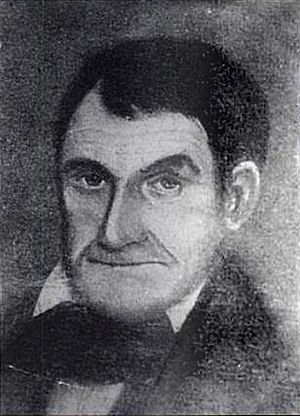Owen Brown (abolitionist, born 1771) facts for kids
Quick facts for kids
Owen Brown
|
|
|---|---|
 |
|
| Born | February 16, 1771 |
| Died | May 8, 1856 (aged 85) Hudson, Ohio, U.S.
|
| Resting place | Old Hudson Township Burying Ground |
| Other names | Squire Brown |
| Spouse(s) |
Ruth Mills
(m. 1793–1808)Sally Root
(m. 1809–1840)Lucy Hinsdale
(m. 1841–1856) |
| Children | 8, including John Brown |
| Relatives | Owen Brown (grandson) |
Owen Brown (born February 16, 1771 – died May 8, 1856) was an important person in American history. He was the father of John Brown, a famous leader who fought against slavery. Owen Brown was a successful businessman. He raised cattle and ran a tannery in Hudson, Ohio, where he prepared animal hides to make leather.
He was also a very strong supporter of ending slavery, known as an abolitionist. Owen Brown helped start several important groups. These included the Western Reserve Anti-Slavery Society and Western Reserve College. He also helped create the Free Congressional Church. Owen Brown gave speeches asking for slavery to be ended right away. He also helped people escape slavery using the Underground Railroad.
People who knew Owen Brown remembered him as a kind and friendly person. He wrote two short stories about his life that we can still read today.
Early Life
Owen Brown was born on February 16, 1771. He was one of ten children. His parents were Capt. John Brown and Hanna Owen Brown. They lived in Torrington, Connecticut. Owen's father fought in the American Revolutionary War. Owen always admired the Founding Fathers of America. His first memory was seeing his father's soldiers leave to fight the British in 1776.
Community Work
Owen Brown was a wealthy tanner, cattle breeder, and land speculator. This meant he bought and sold land, hoping its value would increase. He was very dedicated to serving his community. He played a big part in the early growth of Hudson, Ohio. People in Hudson called him "Squire Brown" because he was so resourceful and energetic. In the 1830s, he was the third richest man in Hudson.
Brown held many important jobs in the community. He was a County Commissioner and a Justice of the Peace. This meant he helped with local government and legal matters. Owen Brown was deeply involved in the abolitionist movement. He was good friends with leaders like Frederick Douglass. Douglass often stayed with the Brown family when he gave speeches nearby. Owen Brown worked with David Hudson to set up one of the first safe houses on the Underground Railroad. He personally helped many enslaved people escape to Canada.
Supporting Education
Owen Brown was a founding trustee of Western Reserve College. He helped choose its location in Hudson. He also oversaw the building of its first main building. During his time as a trustee (1825-1835), Western Reserve College became known for its strong anti-slavery ideas.
After the college's first president died in 1833, a new, more traditional president was chosen. This was an effort to move the college away from the politics of slavery. In 1835, Owen Brown left his position. He joined many teachers, staff, and students from Western Reserve College. They also joined people from Lane Theological Seminary in Cincinnati. They all moved to Oberlin Collegiate Institute, which is now Oberlin College in Oberlin, Ohio.
Owen Brown served as a trustee at Oberlin from 1835 to 1844. He and others helped make Oberlin the first college to accept women. It was also one of the first to accept black students. Owen's own daughter, Florella Brown, studied at Oberlin from 1835 to 1839. There, she met her husband, Samuel Lyle Adair.
Death
Owen Brown died in Hudson, Ohio on May 8, 1856. He was buried at the Old Hudson Township Burying Ground.
See also
 | Georgia Louise Harris Brown |
 | Julian Abele |
 | Norma Merrick Sklarek |
 | William Sidney Pittman |

